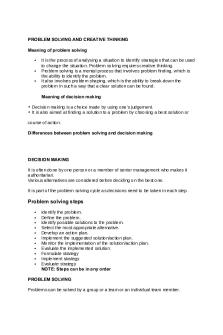Problem Solving and Intelligence Lecture Notes PDF

| Title | Problem Solving and Intelligence Lecture Notes |
|---|---|
| Course | Introduction to Psychology |
| Institution | McMaster University |
| Pages | 2 |
| File Size | 62.4 KB |
| File Type | |
| Total Downloads | 52 |
| Total Views | 144 |
Summary
lecture notes from problem-solving and intelligence lecture...
Description
Problem Solving & Intelligence Intelligence: The cognitive ability of an individual to learn from experience, reason well, remember important information and cope with the demands of daily living. Functional Fixedness: a bias limiting view to using an object only in the way it is traditionally used.
How many different ways can you use a shoe lace 1. timing food 2. hair 3. belt 4. bracelet 5. hair band Louisiana Literacy Test - a test to prove you have minimum 5th grade literacy - but doesn’t make sense and it hard to complete - used in the past to get black people from being able to vote Three Intelligence Tests 1. Functional Fixedness Test - not reliable but is valid; it does test whether you can overcome functional fixedness, but not always reliable 2. Monty Hall Test - not reliable 3. Louisiana Literacy Test - reliable but not valid Do humans behave rationally? Bounded Rationality: Cognitive limitations precent humans from being fully rational Biases: Mistakes that influence judgment *Perception of the world is guided by our experiences Anchoring: The bias to be affected bu am initial anchor, even if the anchor is arbitrary Framing: The bias to be systematically affected by the way in which information is presented. Positive Framing: amount of people who live Negative Framing: amount of people who die Overcome biases by thinking slow, not fast What is rational decision making? 1. Define the problem
2. 3. 4. 5. 6.
identify criteria necessary to judge weigh the criteria generate alternatives rate each alternative compute optimal decision
Opt in policy and opt out policy
Tutorial Notes Piaget’s Developmental Stage theory 1) Sensorimotor (0-2) 1) Object Permanence 2) Pre-operational (2-7) 1) Egocentrism 2) Reversible Relationships 3) Conservation Tasks 4) Seriation 3) Concrete Operational (7-12) 1) Abstract thinking 4) Formal Operation stage (12+)...
Similar Free PDFs

Reasoning And Problem Solving
- 11 Pages

Problem solving
- 2 Pages

Problem Solving
- 12 Pages

PROBLEM SOLVING
- 39 Pages

“Problem Solving”
- 2 Pages

Problem-solving
- 2 Pages

Intelligence - Lecture notes
- 14 Pages
Popular Institutions
- Tinajero National High School - Annex
- Politeknik Caltex Riau
- Yokohama City University
- SGT University
- University of Al-Qadisiyah
- Divine Word College of Vigan
- Techniek College Rotterdam
- Universidade de Santiago
- Universiti Teknologi MARA Cawangan Johor Kampus Pasir Gudang
- Poltekkes Kemenkes Yogyakarta
- Baguio City National High School
- Colegio san marcos
- preparatoria uno
- Centro de Bachillerato Tecnológico Industrial y de Servicios No. 107
- Dalian Maritime University
- Quang Trung Secondary School
- Colegio Tecnológico en Informática
- Corporación Regional de Educación Superior
- Grupo CEDVA
- Dar Al Uloom University
- Centro de Estudios Preuniversitarios de la Universidad Nacional de Ingeniería
- 上智大学
- Aakash International School, Nuna Majara
- San Felipe Neri Catholic School
- Kang Chiao International School - New Taipei City
- Misamis Occidental National High School
- Institución Educativa Escuela Normal Juan Ladrilleros
- Kolehiyo ng Pantukan
- Batanes State College
- Instituto Continental
- Sekolah Menengah Kejuruan Kesehatan Kaltara (Tarakan)
- Colegio de La Inmaculada Concepcion - Cebu








